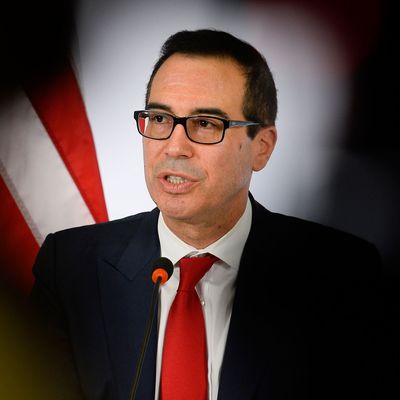
Shortly after his health-care bill failed to garner a vote in the House, President Trump suggested that he was almost glad that the health-care fight had ended prematurely — because it would allow him to get tax reform done quicker.
“The best thing that could happen is exactly what happened — watch,” Trump told the New York Times, minutes after Paul Ryan officially withdrew Trumpcare. “It’s enough already.”
This was an odd thing for the president to say publicly about his own legislative failure. But it wasn’t an odd thing for him to think. The House GOP’s health-care bill was massively unpopular. Had it proceeded to the upper chamber, Trumpcare would have forced many Republican senators to choose between inviting the ire of their base or else that of swing voters. And if the bill were actually passed into law, it would have made life for the GOP’s elderly, rural voters violently worse — and given Democrats an even better shot at retaking the House in 2018.
So, letting Obamacare repeal die was probably the best thing for all involved. Especially since it would allow Trump to move on and bank an easier win on tax cuts (what Republican doesn’t like tax cuts?) sooner than previously expected.
Nearly one month later, Trumpcare’s untimely death has allowed Trump to do no such thing. The White House has refused to take the easy way out and push for some temporary, deficit-ballooning tax cuts. Instead, the administration has called for ambitious revenue-neutral tax reform; or a combination tax reform and infrastructure mega-bill; or, okay, maybe a deficit-ballooning tax cut, but not the one that Trump campaigned on.
Three months into his presidency, Trump no longer has a tax plan. He doesn’t even have a set of principles for a tax plan. Nor does he have a legislative strategy for passing one. Last week, administration officials told the Associated Press that “they want to pass tax legislation with only Republican votes” — but also indicated that their plan might include “a drastic cut to the payroll tax, aimed at appealing to Democrats.”
In an interview with the Financial Times on Monday, Trump’s Treasury Secretary Steve Mnuchin confessed that the administration no longer expects to complete tax reform by August — and blamed this delay on the failure of Trump’s health-care bill.
“It started as [an] aggressive timeline,” Mnuchin told the paper. “It is fair to say it is probably delayed a bit because of the healthcare.”
It’s unclear exactly what Mnuchin meant by this. It’s true that Trumpcare’s failure has made passing revenue-neutral tax reform more difficult for the GOP. And, despite his initial, exuberant acceptance of defeat, the president has pushed for reviving his health-care bill in recent weeks. But it’s also the case that Trumpcare’s speedy failure could have provided the White House with a head start on its tax package.
And yet Mnuchin remains unable to offer any details on the administration’s vision of tax reform. The Treasury secretary would not take any firm position on the House’s controversial border-adjustment tax, and indicated that the White House’s primary idea for generating new revenue was simply to stipulate that the American economy would begin growing at 3 percent as soon as Trump’s tax plan makes the rich even richer:
Asked how the administration would ensure tax reforms were deficit-neutral, Mr Mnuchin stressed how potent a higher growth outlook would be in generating revenue. He said that there could be a difference of close to $2tn in revenues under different economic scenarios, adding that the difference between growth of 1.8 per cent and 3 per cent was “staggering” when compounded.
“Economic growth creates lots of revenues,” he said. “When you calculate whether it is deficit-neutral or not, there are a bunch of different calculations and a bunch of models. I am just pointing out the magnitude of what economic growth does.”
Mnuchin still believes that Trump will sign a tax-reform bill by year’s end. But the president’s reputation as an effective deal-maker — even among Republican voters — may not survive until the fall. In December, 60 percent of Americans told Pew that they were confident Trump would work effectively with Congress; now only 46 percent are.






























